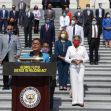As church bells rang throughout downtown Minneapolis, the news spread that the jury in the death of George Floyd found Derek Chauvin guilty on all three charges: second-degree unintentional murder, third-degree murder, and second-degree manslaughter.
The reaction of protesters around the nation was one of bittersweet happiness, as the former police officer was convicted of the murder of an unarmed black man after he was trapped and killed under Chauvin's knees while pleading for his life and saying, "I can't breathe."
Chauvin will not face sentencing for about two weeks for the killing of George Floyd. He faces up to forty years for second-degree murder, up to twenty-five years for third-degree murder, and up to ten years for second-degree manslaughter.
Before the judge can sentence Chauvin, a pre-sentencing report must be created. This report will include information about Chauvin's history and background so that Judge Peter A. Cahill can decide if special circumstances surround the crimes. In legal terms, special circumstances can indicate how Chauvin, now a convicted murderer, should serve a longer term than the state law mandates in its guidelines.
The sentencing follows a trial closely watched by many millions across the globe. Unlike many murder cases, Chauvin was denied a plea deal by former Attorney William Barr. The plea deal would have sent the one-time police offer to jail for a maximum of ten years.
In Minneapolis, the felony murder statute allows the prosecution to win a second-degree murder conviction without proof that the accused had any intention to kill a victim. This unique murder statute means Chauvin would be guilty of felony murder even if the jury found the officer intended to cause bodily harm to Floyd without any plans to kill him.
Before the guilty verdict by the jury, prosecutor Steve Schleicher had told the jury the case was not anti-police but instead something positive for police across the US since the trial held an officer responsible for a crime.
Video played an essential if not decisive role in the trial as well, as jurists watched Floyd die in real-time, after begging Chauvin for many minutes, until he was unconscious, to let him breathe.
In total, the jury deliberated for about ten hours over two days, considered a speedy amount of time, especially when dealing with three different significant charges against Chauvin.
In reaction to the guilty verdict, numerous leaders and everyday people shared their opinions on social media and news programs.
President Barack Obama said, "We stand shoulder-to-shoulder with all those who are committed to guaranteeing every American the full measure of justice that George and so many others have been denied."
The American Civil Liberties Union (ACLU) perhaps summed up the trial that left so many Americans relieved most succinctly.
In a statement issued after the verdict was announced, the ACLU said, "For the first time in Minnesota state history, a white police officer has been held accountable for killing a Black man. While today's verdict is a small win for police accountability and may help heal a grieving community, the systems that allowed George to be murdered — ripping him away from his family and the communities that loved him so much — remain fully intact."






